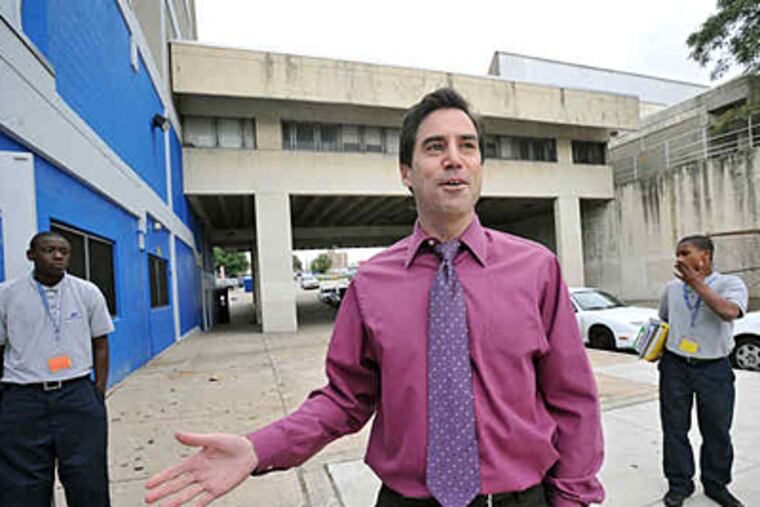Mastery charter schools aim to transform education
When a young businessman named Scott Gordon talked about creating a new charter school in Philadelphia in 2000, he already had a vision of something larger.

When a young businessman named Scott Gordon talked about creating a new charter school in Philadelphia in 2000, he already had a vision of something larger.
"His idea was to reform public education, not just create a school," recalled Jeremy Nowak, head of the Reinvestment Fund, who for seven years chaired the board of Mastery Charter Schools.
After touring one of Mastery's four schools on Tuesday, U.S. Education Secretary Arne Duncan, the Rev. Al Sharpton, and former House Speaker Newt Gingrich said Gordon's vision of providing rigorous, college-prep education for all could become a national model for public schools.
"It was a thrill for us," Gordon said yesterday. "We said clearly we wanted to make a change in Philly, but we also wanted to demonstrate that all kids, regardless of their backgrounds, can achieve at the highest levels."
The Mastery approach aims to prepare students for college with a strict behavior code and rigorous curriculum with personal responsibility and interpersonal skills.
The model includes a longer school day (8 a.m. to 4 p.m.) and a longer school year. Struggling students must attend tutoring and Saturday sessions. All students must show "mastery" by earning a grade of at least 76 percent before advancing.
Gordon, 47, a Philadelphia native, took an unorthodox path to education reformer.
A Phi Beta Kappa economics major from the State Univerity of New York-Binghamton with an MBA from Yale University, Gordon began his career working for General Foods Corp.
But his interests went beyond business. In college, Gordon was among 50 nationwide cited for "outstanding potential for public service leadership."
A 1980 graduate of Cherry Hill High School East, Gordon moved back to the region in 1993 to found Home Care Associates, a worker-owned home health-care company modeled after one in the Bronx.
Working with former welfare recipients showed Gordon the need to improve urban schools. But it was his work as a consultant on a Greater Philadelphia First project on the demand for more skilled workers that led him to found a charter school with businessmen in the area.
Among those he turned to was Nowak, president and chief executive officer of the Reinvestment Fund, a nonprofit that finances neighborhood and economic-development projects. Gordon asked him to help found a charter and transform public education.
"I thought there was something wonderfully audacious about that," said Nowak, whose nonprofit had provided start-up financing for Gordon's Home Care Associates. "I couldn't resist."
Nowak, who nows heads a foundation that supports all Mastery schools, said he had been impressed by Gordon's intelligence, focus, discipline, and tenacity.
"We have watched him grow and develop. We are just so proud that Mastery has become an important, national model."
Gordon's initial charter school - Mastery Charter School Lenfest Campus, which opened in 2001 - won kudos for academic success and for sending 90 percent of its graduates to college.
Based on the record at Lenfest, Paul Vallas, the former Philadelphia schools chief, and the Philadelphia School Reform Commission tapped Mastery to convert three of the district's most-troubled middle schools: Thomas in South Philadelphia, Shoemaker in West, and Pickett in Germantown. With new leaders, new teachers, and a new approach, Mastery saw violence plummet and test scores soar, winning national honors. At Shoemaker, for example, eighth-grade reading scores doubled over three years to more than 80 percent at grade level.
Jordan Meranus, partner of the NewSchools Venture Fund, a nonprofit with offices in Boston and California, calls himself "a big fan of Scott Gordon's."
"There is a no-excuses mantra," Meranus said. "A lot of people talk about high expectations in education. Scott lives and breathes it."
Meranus, who joined Mastery's board five years ago, said he had seen the dramatic transformation of troubled Philadelphia schools.
Gordon, he said, has such expert management skills that he has been able to transmit his vision of educational excellence to students and staff. "Now, top to bottom, everyone has bought into that vision," Meranus said.
Tall, slim and self-effacing, Gordon seems uncomfortable in the spotlight. When attention turns to him, Gordon seeks to shift it to the staff and students.
But he's gratified that his vision is now in sync with efforts by the Obama administration and Philadelphia Schools Superintendent Arlene Ackerman to turn around troubled schools.
Though he's gotten nibbles from school districts elsewhere, Gordon said that Mastery preferred to grow in Philadelphia.
"We'd like to take on the most difficult schools. We'd like to have both elementary and high schools, and we'd like to take on the most difficult areas in the city."
It all fits into the plan he put together nine years ago.
"It wasn't ever going to be a few charter schools," Gordon said. "It was going to be a way to change the way schools work and to really raise the bar for every student.. . . We're getting a little closer every day."